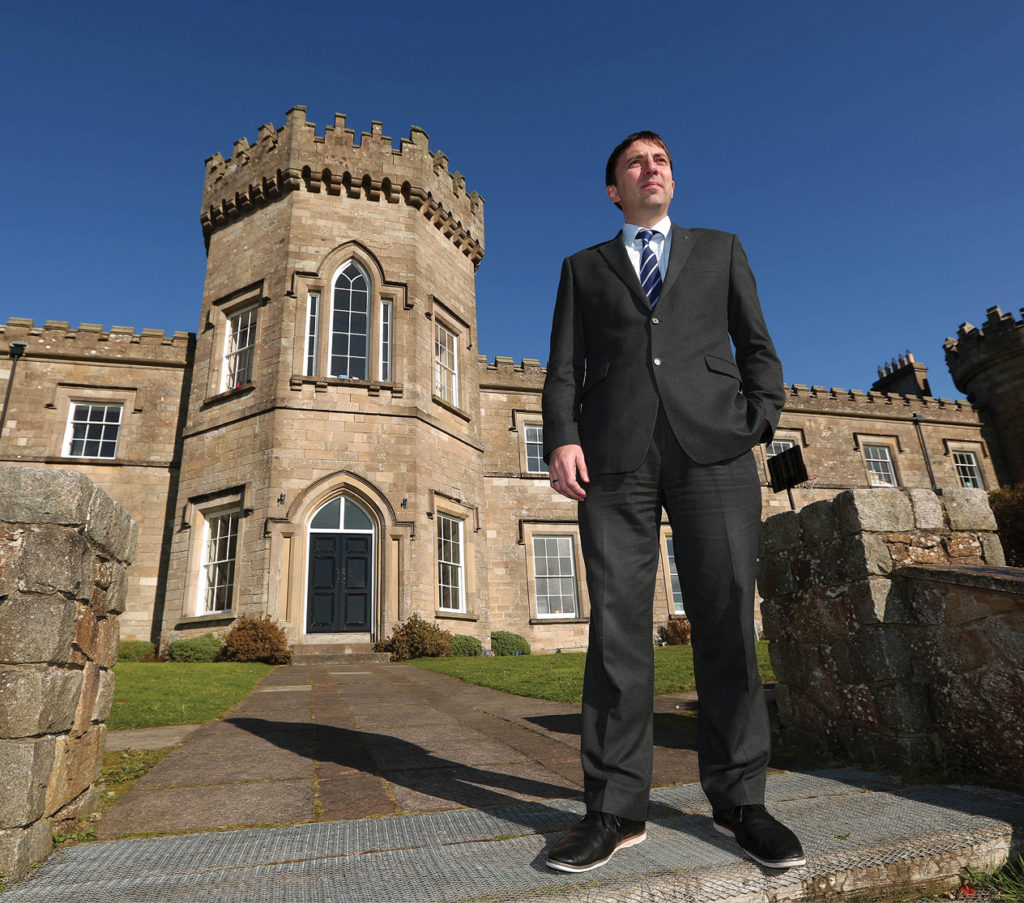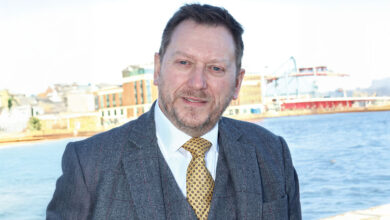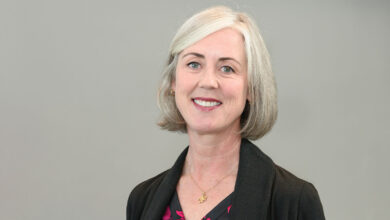Immersed in Irish
From acorns grow mighty trees. That is the hope, at least, of the Irish Medium sector in the oak leaf county. Ciarán Galway visits Gaelcholáiste Dhoire.
Dungiven Castle, an imposing early 19th century structure, is now home to one of only two post-primary Irish Medium schools in Northern Ireland. Gaelcholáiste Dhoire opened its doors to an initial cohort of 16 students in September 2015. As of September 2016, the multidenominational, all-ability, co-educational school has now trebled its student population with 48 children from across the North West now enrolled.
Demand
Principal Diarmaid Ua Bruadair, an educationalist who previously taught in Coláiste Feirste, outlines the growth of the Irish Medium sector in the surrounding area.
“This project is probably the most important in the Irish Medium sector in 25 years.” In 1991, the seeds of education through the Irish language had only begun to be sown in rural Derry. “The concept for Gaelcholáiste Dhoire stems from the [subsequent] growth,” he states.
Over the past seven years there has been a surge of investment in an effort to build up the five Irish medium primary schools in the surrounding area and to increase enrolment.
“In our immediate area we have five Irish medium primary schools. Of those, we have one each in Dungiven, Limavady, Magherafelt, Tirkane and Ballinascreen. Out of those five, when we were opening our doors, only three of the schools had students in primary seven, the other two had not reached that stage yet. So, while the numbers in the school are initially small, they are actually growing very fast. The projection is good. Over the next seven years, we would hope to have approximately 60 to 70 students coming in to first year per annum.”
Ua Bruadair also acknowledges: “While it does, and it caused some interest in the media and political spheres, seem very small to begin with, we have in fact trebled in size in one year. It’s a prime example how Irish Medium education, working in conjunction with the education authority and the Department of Education, have delivered an excellent project. I am very proud to be associated with it.”
“I don’t consider myself, the people I work with or the people who speak Irish in my life to be projects of any political party”
Value
Ua Bruadair suggests that a knowledge of the language enables learners to develop a deeper appreciation of the world around us. “A knowledge of Irish allows our students to become very aware of their surroundings. The influence that language has had on the country, on the culture, on the development of place names and history. I would say that it helps them to see their history and their environment in full colour, rather than in black and white.”
Fittingly, a poignant excerpt, penned by south Derry native Seamus Heaney, hangs above Diarmaid’s desk. It reads: “Not to learn Irish is to miss the opportunity of understanding what life has meant and could mean in a better future. It is to cut oneself off from ways of being at home. If we regard self-understanding, imaginative enhancement, cultural diversity and a tolerant political atmosphere as desirable attainments, we should remember that a knowledge of the Irish language is an essential element in their realisation.”
However, while Ua Bruadair regards the language as having an inherent intrinsic value, Gaelcholáiste Dhoire subscribes to an environment of immersive education and as such, maintains that bilingualism has a number of extrinsic benefits for learners.
“Providing a language rich environment where students whose first language isn’t the language of the school, can develop a very high level of literacy in a short space of time. They do that by being literally immersed in the language. We try to create an environment where students speak Irish from when they come into school, until they leave, including their extra-curricular activities. That’s the ethos that we have in school. All of the subject teachers are language teachers as well. We consider that to be part of the job. We make sure that all of the students have the right vocabulary tools to access the curriculum. It’s a very bespoke kind of setting. It’s not unique. We’re one of many Irish Medium schools on the island. We are also a part of a global family of immersion schools, including, for example, those in Wales, Scotland, New Zealand, the Basque country and in Canada.”
He is also keen to note research which quantifies the benefits of bilingualism. “There are cognitive benefits, because as the brain is working harder, it gets better at solving problems and looking at things through different perspectives. The majority of the world is bilingual or multilingual. So, the bilingual children who come to our school are part of the community. But aside from the cognitive benefits and the benefits of any kind of bilingualism, there is a certain advantage to be derived from being Irish-speaking in Ireland.”
A core advantage, the principal emphasises, is: “The [encouragement] of confident children, who come here to our school and call me Diarmaid, who build relationships with their teachers based on the dignity of the person rather than their title and are allowed to grow and develop the skills to communicate and to be respectful. We have a lot to offer aside from just a language.”
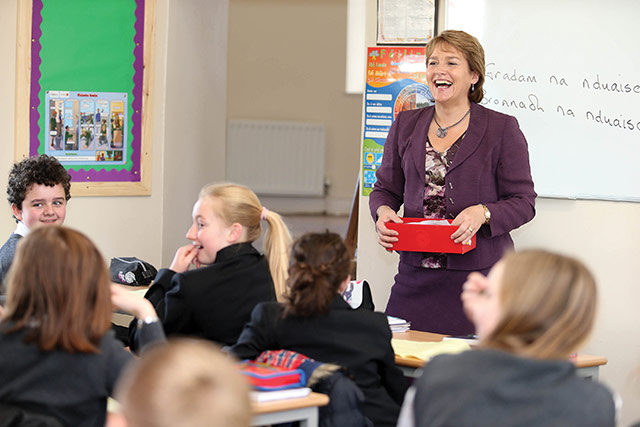
Growth
Ua Bruadair highlights indications which identify Irish-medium education as a growth sector in the North.
“The Irish-medium sector is very healthy. It’s one of the few sectors is actually growing at the minute. One of the reasons for this is that it is so small. The Irish Medium sector probably represents three per cent of the school population in the North. So there’s room for growth,” he asserts.
This process has already begun: “Over the last six or seven years, all of the Irish Medium schools in the North have grown around a rate of 6 per cent per year. There were approximately 400 students who left primary seven in June of this year and around 700 came into primary one in September. The sector is vibrant and we would regard the next period of growth to be one of consolidation.”
To ensure the future viability of the school, the principal stresses several requirements.
“The education establishment in the North hasn’t tried a project like this before. There will be lessons learned from this experience. In the South they have managed to create a system by which small schools are supported. They’ve had more experience.” Ua Bruadair uses the examples of three southern schools which all opened within a year of Gaelcholáiste Dhoire with similar numbers and have now experienced a surge in their enrolment. He maintains: “You can see that the proper support, from a funding point of view, is a central part of the equation,” and adds: “Also from an infrastructural point of view, we need specialist classrooms. We need all of the subjects on site to ensure that the immersion setting is developed and maintained, in order to flourish properly.”
Challenges
That is not to say that there are not immediate and pressing challenges,
He suggests: “Over the last 15 years, we have had probably one particular brand of leadership in the education sector, which wouldn’t have been opposed to Irish Medium education and did, in some circumstances, facilitate it. There is a legal duty on the Department of Education, under the Good Friday Agreement, to facilitate and encourage Irish Medium education. There is a statutory duty on the Department to facilitate the growth of our sector. The challenge will concern how best to do that. There will be different challenges stemming from the change of leadership, with a different emphasis. It wasn’t easy for this project to get off the ground. It took five years to get this school opened, but it did get across the line. There are challenges ahead.”
However, there are also opportunities going forward.
“The [main] opportunity is that these students have the chance to attend an immersion school. It’s not just a school. It’s rooted in the Irish language community in County Derry. We’re also really keen to work with other sectors and groups, especially schools which are not similar to ourselves. The Irish Medium sector is an open and welcoming sector. This school provides us with an opportunity to engage and cooperate with schools of different traditions, so we can showcase the talents of our students.”
Children educated within the Irish Medium sector, Ua Bruadair argues: “Will have more, not less opportunities. Indeed, in the 60s and 70s it was thought that raising a child bilingually was going to hold that child back. Now we have come full circle.”
Ua Bruadair also concedes that the language has, to some extent, inherited undesirable politicisation. Though he speaks diplomatically on the complex issue.
“It seems that in our part of the world everything is political. No matter what topic we are talking about, politics is pervasive. The Irish language is no different. It has been perceived to be the realm of one political party and that perception has been the reason behind claims of politicisation. But is also within the boundaries of possibility that negativity towards the language results in this politicisation as well. There are probably elements on all sides of the political spectrum that have used the Irish language to promote or attack.”
Ua Bruadair passionately articulates: “I am an educationalist. I am an Irish language speaker and activist. I was born this way. My father changed his name to Irish when he met my mother and decided to get married and raise their kids through Irish. That’s what I’m about. I don’t consider myself, the people I work with or the people who speak Irish in my life to be projects of any political party or of a threat to any political party. We are part of the fabric of this society and we don’t intend to be a threat to anyone.”
Talking about the region in which he now works, he contends: “It’s a part of the DNA of this community. There would have been native speakers of Irish in the Sperrin mountains within living memory and really the communities here are getting back in touch with where they came from. That should be regarded, I believe, as a legitimate aspiration.”
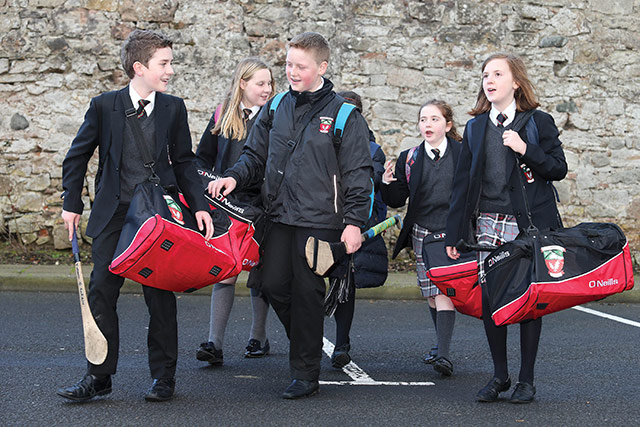
Curriculum delivery
The school however has placed great emphasis on ensuring that the curriculum is delivered in its full format.
“At moment we have two year groups. We have five teachers between full time and part time. We are able to provide all of the subjects on the Key Stage Three Curriculum through the medium of Irish. This year we had more members of staff and all of the teachers are now teaching three subjects. Next year we will employ more specialist teachers and that number will decrease. So by the time that we have students GCSE level, we will be able to cover a lot more subjects with specialist teachers.”
The school, and indeed the wider sector, has also ensured deep consideration for special educational needs provision.
Ua Bruadair stresses: “We have a special educational needs coordinator like any other school and she works very closely with Coláiste Feirste which took a very brave decision about six years ago to develop a learning support centre. They appointed a coordinator to that centre, special educational needs teachers, Irish and English literacy support and trained classroom assistants, with the idea being that this would be a centre of excellence for the Irish Medium sector. So there is support there. We look at every teacher as a special educational needs teacher and our students are catered for in the classroom and because there are smaller numbers we get to know them very well and assess what their needs are very quickly.”
Gaelcholáiste Dhoire’s principal also expresses a hopeful vision for the future.
“I would be hoping that over the next number of years we will see more students coming into the school and a larger complement of staff. I hope to see us become part of the fabric of Dungiven, working closely with our neighbours and communities throughout Derry and, in due course, become a medium-sized school that will be very successful into the future.”
Diarmaid Ua Bruadair, Principal of Gaelcholáiste Dhoire
Diarmaid grew up in the urban Gaeltacht on west Belfast’s Shaw’s Road. The Irish speaking community was established there by young couples who wanted to develop an immersive language community within which to raise their families. Diarmaid subsequently attended the first Irish Medium school in the Gaeltacht. After numerous other jobs, he went on to teach in Coláiste Phobail Féirste for 14 years and was part of the senior leadership team there.

